I took these pictures while riding Amtrak’s westbound Empire Builder through Montana on May 24, 2003. The pictures begin with the train’s arrival in Havre, Montana.
As the train passed the Havre engine terminal, a variety of motive power could be seen. Norfolk Southern #9086 is a 4,000-horsepower Dash 9-40CW that was built by General Electric in March 1997. Burlington Northern Santa Fe #6730 is a 3,000-horsepower SD40-2 that was built by the Electro-Motive Division of General Motors in September 1979 as Atchison, Topeka & Santa Fe #5071. Following the merger of the Burlington Northern and the Atchison, Topeka & Santa Fe on September 22, 1995, this locomotive became Burlington Northern Santa Fe #6730 on January 20, 1998. Burlington Northern Santa Fe #7909 is a 3,000-horsepower SD40-2 that was built by the Electro-Motive Division of General Motors in June 1979 as Colorado & Southern #7909. Colorado & Southern was a subsidiary of Burlington Northern, and its locomotives were painted in Burlington Northern colors. The Colorado & Southern was formally merged into the Burlington Northern on December 31, 1981, and this locomotive became Burlington Northern #7909. Following the merger of the Burlington Northern and the Atchison, Topeka & Santa Fe on September 22, 1995, this locomotive became Burlington Northern Santa Fe #7909.
Near the Havre shops, BNSF #507 is a 4,000-horsepower Dash 8-40BW that was built by General Electric in October 1990 as Atchison, Topeka & Santa Fe #507. Following the merger of the Burlington Northern and the Atchison, Topeka & Santa Fe on September 22, 1995, this locomotive became Burlington Northern Santa Fe #507 on May 8, 2001 and was repainted into Burlington Northern Santa Fe's "Heritage II" paint scheme on June 6, 2001.
Havre is only 40 miles from the Canadian border, and the Border Patrol meets Amtrak's Empire Builder in Havre, to catch illegal aliens attempting to board the train. As a result, there are often Border Patrol vehicles parked at the station.
Leading the westbound Empire Builder, Amtrak #152 is a 4,250-horsepower P42DC that was built by General Electric in March 2001. It is wearing the first version of Amtrak’s “Phase V” paint scheme.
Trailing is Amtrak #96 is a 4,250-horsepower P42DC that was built by General Electric in June 1997. It has been repainted with the new version of Amtrak’s “Phase V” paint scheme.
The small Hands Across the Border Park at the Havre depot features a statue of an American Border Patrol officer shaking hands with a Royal Canadian Mounted Police officer.
On display next to the depot in Havre is former Great Northern Railroad 4-8-4 steam locomotive #2584, an S-2 Class 4-8-4 that was built by the Baldwin Locomotive Works in 1930 and was put on static display next to the Have depot on May 15, 1964.
A sign next to the locomotive tells its history:
This Northern type locomotive, survivor of the last steam engines acquired by the Great Northern Railway for main-line passenger service, was placed on permanent exhibition here on May 15, 1964.A powerful and speedy locomotive, this engine now looks every bit the aristocrat that it was during the yrs. of its pre-eminent association with the Empire Builder and the Oriental Limited. The Empire Builder was inaugurated in June, 1929, and was pulled by a Mountain type locomotive, but popularity of the train led to addition of cars to the consist, and this necessitated more powerful engines.
In 1930 Great Northern acquired 14 Class S-2 steam locomotives from Baldwin Locomotive Works for service on the Empire Builder and the Fast Mail trains. This engine – No 2584 - is the last of the 14 engines. Samuel Vauclain, President of Baldwin described the Class S-2 engines as "the finest, most powerful steam passenger locomotives ever built up to this time." These engines were operated in freight service after the Empire Builder was streamlines and diesel powered in 1947, and were retired in 1955.
Locomotive and tender are 103 feet 3 inches long, weight 764,680 pounds, and height from rail to top of stack is 16 feet. No 2584 was an oil burner and developed 58,305 pounds of tractive effort. Each of the 8 drive wheels is 80 inches high.
The track on which No 2584 stands is laid to Great Northern main line specifications. The creosoted ties are supported on a sub-ballast consisting of 6 inches of crushed rock chips and a ballast consisting of 6 inches of crushed pink quartzite rock. Both of which are quarried by the Great Northern in Montana. Welded rails fully tie plated and anchored, weight 115 pounds to the yard.
The depot in Havre, at 235 Main Street, is not only an Amtrak station; it also a local base of operation for Burlington Northern-Santa Fe freight operations and maintenance crews. As a result, it is a large depot for a city of Havre's size. The Burlington Northern Santa Fe was formed in 1995 when the Burlington Northern Railroad (successor to the Great Northern) and the Atchison, Topeka & Santa Fe Railroad merged together. The station in Havre still showed signs of its Burlington Northern heritage with an apparent identity crisis. In front of the depot on the street side is a statue of James J. Hill. Hill formed the Great Northern Railroad in 1889 from the bankrupt St. Paul and Pacific Railroad, and extended it to Seattle by 1893. The commercial possibilities realized in the northern United States due to Hill's Great Northern Railway earned him the nickname of "The Empire Builder."
A consist of freight locomotives approached the Havre depot, led by Burlington Northern Santa Fe #4716, a 4,400-horsepower Dash 9-44CW that was built by General Electric in November 1997.
The second unit is Norfolk Southern #7062, a 3,500-horsepower GP50 that was built by the Electro-Motive Division of General Motors in November 1980 as Southern Railway #7062. Following the merger of the Southern Railway and the Norfolk & Western in 1982, this locomotive became Norfolk Southern #7062.
A sign near the Havre railroad depot tells the story of Havre's early days.
WELCOME
TO HAVRE
(pronounced
Have'er)
The naming of Havre,
according to William T. Cowan's memoirs.
The coming of the railroad in 1887 and '88 brought many workers
and their families to Bull Hook Bottoms, later called Havre, according to
William T. Cowan's memoirs.
The name Havre came from the following story:
"Two French-Canadian squatters on Bull Hook Bottoms were French Gus
Descelles, a little sawed off man, and Joe De Mars, a very large, strong
man. They got in a fight over the affection of a charming girl and Joe De
Mars got the best of the struggle. Little French Gus reportedly said 'you
can have her' and this is how Havre supposedly got it's name." The Great
Northern Railway was the main supply line for Fort Assinniboine, located 5
miles southwest of Havre. The railroad is still one of the main economic
forces in the community.
On the Havre depot is this handmade Telecommunications sign featuring a depiction of a General Electric Dash 9-44CW locomotive and the slogan “We Move Information.”
As Amtrak’s Empire Builder continues west through Montana, it enters Glacier National Park and begins crossing the Rocky Mountains.
The westbound Empire Builder eventually
crosses the Middle Fork of the Flathead River near Nimrod, Montana on Java
Trestle, at the point where Java Creek flows into Middle Fork of the Flathead
River. This view from Java Trestle shows the clear blue water of the Middle
Fork of the Flathead River.
The railroad passes through Snowshed #12, the last of a series of structures that protect the railroad from winter slides and avalanches. Just after leaving Snowshed #12 is this view of the Middle Fork of the Flathead River. The bridge carrying U.S. Highway 2 Bridge over the river is visible in the background.
As the train made its station stop in Essex, Montana, it
passed a number of rustic residences.
There is a small Burlington Northern Santa Fe rail yard at
Essex where helper locomotives and maintenance equipment can be found.
Adjacent to the yard is the Izaak Walton Inn. Named after English writer Izaak Walton, for whom the Walton Ranger Station in Glacier National Park is also named, the inn was built on railroad property in 1939 in three months at a cost of $40,000 by the Addison Miller Company, which also operated it under contract for the Great Northern Railway as lodging for railway workers. Measuring 36 feet by 114 feet, the Tudor Revival inn featured 29 guest rooms, 10 bathrooms, a lobby, dining room, kitchen with a two-ton stove, drying room, store room and general store.
Located at the south end of
Glacier National Park 27 miles from West Glacier and 30 miles from East
Glacier, it was anticipated that Essex would become a southern gateway to
Glacier National Park, however World War II prevented that development. With
the inn never living up to its tourism potential, the Addison Miller Company
sold it to Harry Stowell in 1965 for $5,000. George A. Walker purchased it in
1968. Sid and Millie Goodrich bought it in 1973. Larry and Linda Vielleux
acquired it in 1982. The inn was added to the National Register of Historic
Places on October 18, 1985, and was renovated in 1995 with bathrooms added to
every guestroom.
West of Essex, Montana, the route of Amtrak's Empire Builder parallels U.S. Highway 2, which featured red-tinted pavement near Nyack, Montana.
In addition to U.S. Highway 2, Amtrak's Empire
Builder also parallels the Middle Fork of the Flathead River as it
skirts the south edge of Glacier National Park, as seen here near Nyack,
Montana.
At Nyack, Montana, there is a wye for turning helper locomotive consists. Here we see Burlington Northern Santa Fe #7868, a 3,000-horsepower SD40-2 that was built by the Electro-Motive Division of General Motors in October 1978 as Colorado & Southern #7868. Colorado & Southern was a subsidiary of Burlington Northern, and its locomotives were painted in Burlington Northern colors. The Colorado & Southern was formally merged into the Burlington Northern on December 31, 1981, and this locomotive became Burlington Northern #7868. Following the merger of the Burlington Northern and the Atchison, Topeka & Santa Fe on September 22, 1995, this locomotive became Burlington Northern Santa Fe #7868.
Kayakers can sometimes be seen on the Middle Fork of the Flathead River.
As the Empire Builder makes its station stop at West Glacier, Montana, the Travel Alberta Visitors Information Centre on Going-to-the-Sun Road can be seen from the train. This centre features visitor information and interpretive displays promoting the Canadian province of Alberta, along with restrooms, telephones, and picnic areas.
The trailing unit of a freight train in the BNSF yard in Whitefish, Montana, Norfolk Southern #6707 is a 3,800-horsepower SD60 that was built by the Electro-Motive Division of General Motors in August 1989 as Conrail #6852. Following the breakup of Conrail between Norfolk Southern and CSX Transportation on June 1, 1999, this locomotive was acquired by Norfolk Southern, becoming #6707, though it still wore its Conrail colors at this point.
Part of a freight train in the BNSF yard in Whitefish, Montana, Milwaukee Road #4512 is a boxcar that was built in 1972 and still wears its original paint over 30 years later, despite the bankrupt Milwaukee Road having been taken over by the Soo Line in February 1985.
Making its station stop in Whitefish, Montana, Amtrak’s westbound Empire Builder stopped alongside Great Northern NW3 #181 in Whitefish, Montana. Built by the Electro-Motive Division of General Motors in March 1942 as Great Northern #5406, this 1,000-horsepower diesel locomotive was the last of the only seven NW3s built, all for the Great Northern. It was renumbered to #181 in 1943.
On August 30, 1965, the Great Northern sold #181 to Anaconda Aluminum in
Columbia Falls, Montana, where it became their #900. When no longer needed,
Anaconda Aluminum donated the locomotive to the Stumptown Historical Society in
Whitefish, Montana. It was restored to Great Northern colors and placed on
permanent static display next to the Whitefish depot on November 19, 1990.
It was getting dark when Amtrak’s westbound Empire Builder departed Whitefish, Montana, but I was able to get one last photograph of a pair of Burlington Northern Santa Fe 4-axle EMD locomotives, only one of which can be identified. Burlington Northern Santa Fe #2257 is a 2,000-horsepower GP38-2 that was built by the Electro-Motive Division of General Motors in June 1973 as St. Louis-San Francisco (also known as the Frisco) #402. The Frisco was merged into the Burlington Northern on November 21, 1980, and this locomotive became Burlington Northern #2257. Following the merger of the Burlington Northern and the Atchison, Topeka & Santa Fe on September 22, 1995, this locomotive became Burlington Northern Santa Fe #2257 on April 25, 1998.



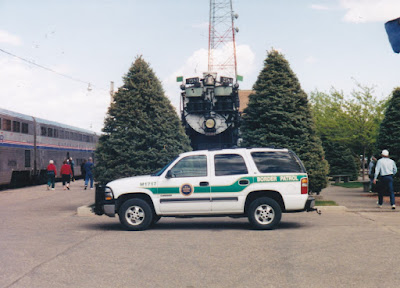



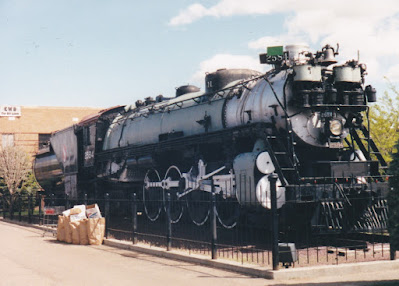



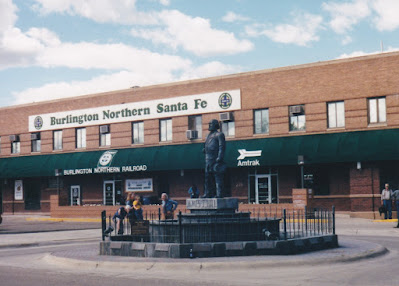




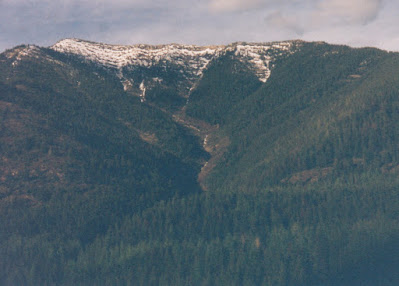





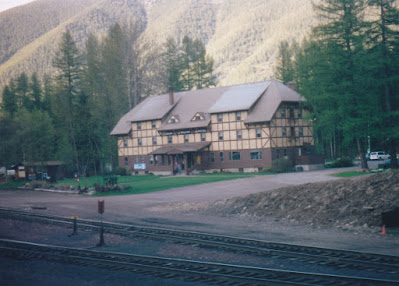


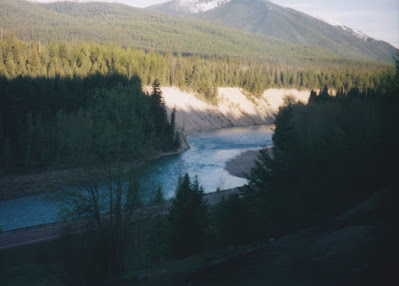

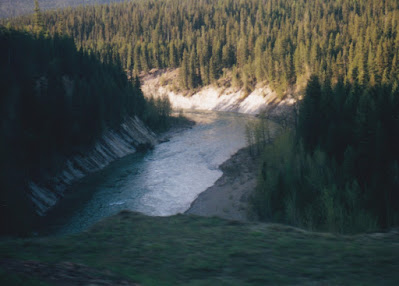



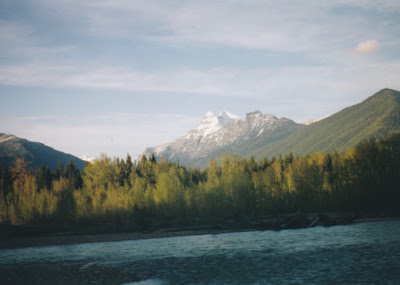


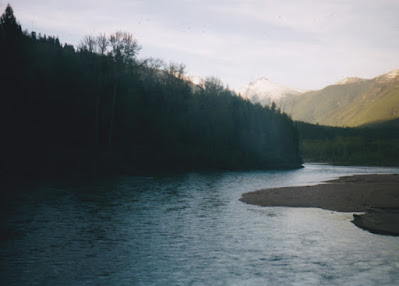


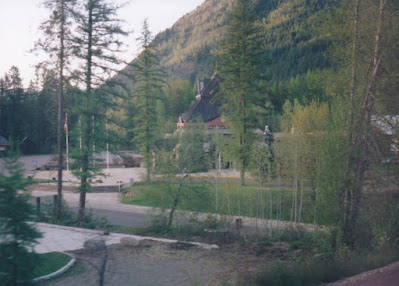
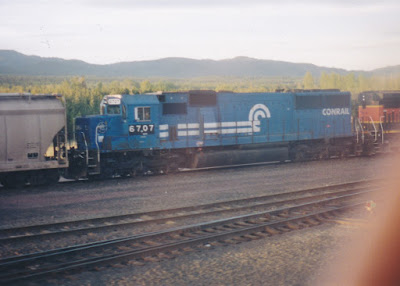
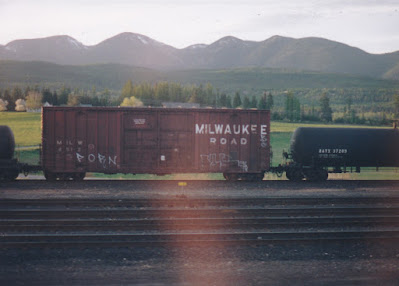


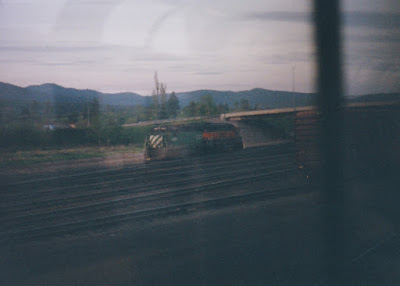
No comments:
Post a Comment